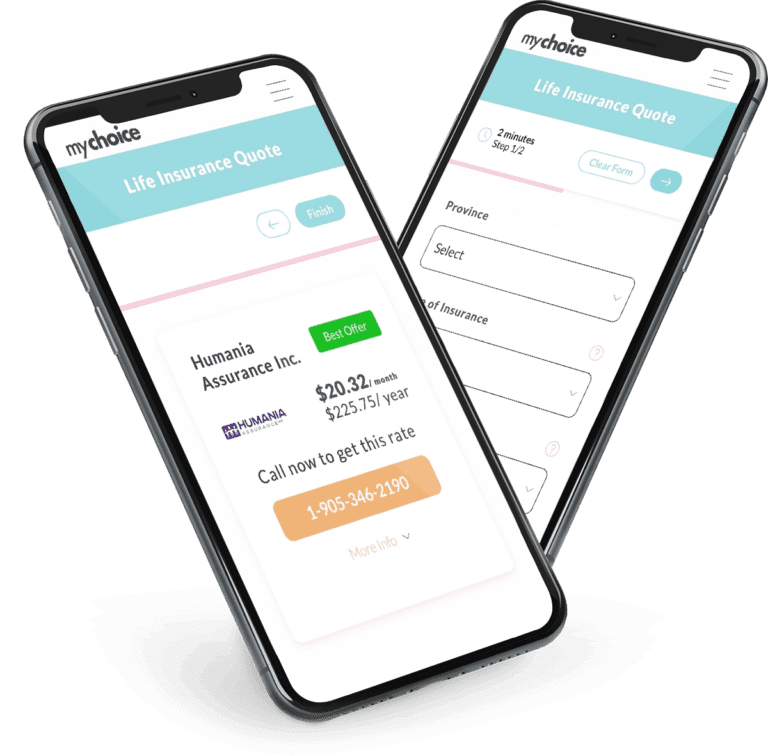What Is Universal Life Insurance?
Universal life insurance is a type of permanent life insurance that provides lifelong coverage. It also features flexible premium payments and multiple investment vehicle choices. While it has similarities to whole life insurance, a universal life policy grants you extra flexibility in terms of investments, which may help you build cash value faster.
Since it provides lifelong protection, universal life insurance is usually more expensive than term life insurance, which protects you for a specific period.
How Does Universal Life Insurance Work?
Universal life insurance works by providing a death benefit to your beneficiaries upon your passing. However, universal life insurance has some flexibility over how your death benefit works. Here are the three most common ways your death benefit will be paid out:
Part of your universal life insurance premium payments go to an investment account, which can accrue value over time. The account value features tax-deferred growth and can grow faster or slower depending on what kind of investment you choose. Some common investment account types for your universal policy are:
Read our guide on whether life insurance can be used as an investment to see if investing through insurance is right for you.
As a universal life policyholder, you can pick more than one investment account type. If you pick multiple investment account types, you also need to specify how much of your premiums goes into each account.
Similar to whole life insurance, you can also use the money stored in your account while you’re still alive.
You can access your account value by:
- Taking out policy loans.
- Withdrawing cash from your policy.
- Collateralizing your insurance policy.
- Surrendering the policy and taking its surrender value.
Universal Life Insurance Cost in Canada by Policy Type
Below are the average monthly universal life insurance premiums in Canada by policy type and gender, showing how costs increase for shorter payment terms as you pay off your policy faster.
| Policy Type | Male | Female |
|---|---|---|
| Universal Life Insurance | $278.00 | $241.75 |
| Universal Life Insurance – 20 Pay | $496.57 | $415.84 |
| Universal Life Insurance – 15 Pay | $777.72 | $721.60 |
| Universal Life Insurance – 10 Pay | $936.68 | $776.47 |
Universal Life Insurance Cost in Canada by Age and Gender
Universal life insurance premiums increase steadily with age, reflecting the higher risk insurers take on as applicants get older.
Below are the average monthly universal life insurance premiums in Canada by age, gender, and payment structure, illustrating how both age and shorter payment periods impact cost.
| Age | Gender | Universal Life | Universal Life – 20 Pay | Universal Life – 10 Pay |
|---|---|---|---|---|
| 25-year-old | Male | $181.33 | $369.80 | $685.63 |
| Female | $155.50 | $289.18 | $528.66 | |
| 35-year-old | Male | $278.00 | $496.57 | $936.68 |
| Female | $241.75 | $415.84 | $776.47 | |
| 45-year-old | Male | $452.17 | $808.13 | $1,417.09 |
| Female | $385.92 | $680.78 | $1,210.06 | |
| 55-year-old | Male | $730.08 | $1,150.59 | $1,946.09 |
| Female | $608.41 | $955.43 | $1,736.90 | |
| 65-year-old | Male | $1282.32 | $1,694.81 | $2,725.00 |
| Female | $1136.05 | $1,519.64 | $2,453.86 |
Universal Life Insurance Cost in Canada by Coverage Amount
Universal life insurance premiums increase with higher coverage amounts, although larger policies often offer better value per dollar of protection.
Below are the average monthly universal life insurance premiums in Canada by coverage amount, gender, and payment structure, showcasing how premiums increase with higher coverage limits and shorter payment terms.
| Policy Type | Coverage Amount | Male | Female |
|---|---|---|---|
| Universal Life | 250,000 | $145.50 | $126.33 |
| 500,000 | $278.00 | $241.75 | |
| 1,000,000 | $548.00 | $475.40 | |
| Universal Life – 20 Pay | 250,000 | $274.44 | $229.05 |
| 500,000 | $496.57 | $415.84 | |
| 1,000,000 | $985.12 | $823.66 | |
| Universal Life – 10 Pay | 250,000 | $509.12 | $430.51 |
| 500,000 | $936.68 | $776.47 | |
| 1,000,000 | $1,865.33 | $1,544.91 |
What Are the Types of Universal Life Insurance?
There are three types of universal life insurance, each with its own unique features. Here’s a look at the most common types of universal life insurance in Canada:
Universal Life vs Whole Life Insurance
The main thing universal life and whole life insurance have in common is that they both offer lifelong coverage. Whenever you pass away, your beneficiaries will receive the policy’s death benefits as long as your premiums are paid up.
However, there are key differences between the two types of permanent life insurance. Here’s a comparison table to help you identify what sets them apart:
| Universal life insurance | Whole life insurance |
|---|---|
| May have flexible premiums | Fixed premiums from the start of your policy |
| Lets you choose when you pay premiums | Fixed premium payment schedule determined at the start |
| Allows you to make extra deposits outside premium payments | May require approval to make extra deposits outside premium payments |
| You can choose where to invest your premiums | The insurer chooses where to invest your premiums |
| You can raise or lower your death benefits and premium payments | Your death benefit and premium payments are fixed |
| Doesn’t have guaranteed cash value growth through investment returns, since they’re based on investment performance | Insurer guarantees cash value growth through investment returns |
Need a more comprehensive guide to the differences between these two insurance types? Here’s our article on the differences between whole life and universal life insurance.
Universal Life vs Term Life Insurance
Term life insurance is the simplest form of insurance, contrasting the complexity of universal life insurance. With a term policy, you pay premiums to receive insurance coverage for a certain period. If you pass away within the insurance period, your beneficiaries will receive the death benefit. If you outlive your policy, you won’t receive anything.
Let’s go over the differences between universal life insurance and term life insurance to help you choose which one is the best for you:
| Universal life insurance | Term life insurance |
|---|---|
| Provides lifelong insurance coverage | Provides insurance coverage for a certain period |
| Offers a cash value component | Has no cash value component |
| Complex and potentially more expensive | Simple and cost-effective |
Still can’t decide between universal life and term life insurance? Here’s a comprehensive comparison to help you weigh the options.
Why You Should Get Universal Life Insurance
Every type of life insurance has its set of benefits and drawbacks. Is universal life insurance right for you? Let’s take a look at its advtanges first:
Why You Shouldn’t Get Universal Life Insurance
For contrast, here are some of the disadvantages of owning a universal life insurance policy.
Is Universal Life Insurance Worth It?
Universal life insurance is right for you if you want long-term insurance protection and higher returns on your investments. However, you should also remember that universal life insurance has a higher risk than whole life insurance since your investments can fail and reduce your account’s value.
If you want lifelong insurance protection but don’t want to bear the risk of loss, we suggest taking whole life insurance instead. If you want affordable insurance protection that only lasts a certain time, we suggest choosing term life insurance.
Universal life insurance provides flexible investments, tax-deferred cash value growth, and adaptable premium payments. However, you still need to put quite a lot of money to accumulate enough cash value for it to mean something. That means you need to be a relatively high earner to get the most value from universal life policies.
Universal life insurance isn’t a “set it and forget it” deal, either. Unlike whole life insurance where you’re only passively investing, you need to keep a close eye on universal life insurance investments to ensure you’re not losing money on them. This means you need to dedicate time and effort to study the market and monitor your investment’s performance.
At the end of the day, universal life insurance may or may not be right for you, depending on your protection and investment needs. Talk to an insurance broker if you need help choosing the best insurance product to purchase.
Frequently Asked Questions About Universal Life Insurance
What are the investment options available within a universal life policy?
Examples of investment options available within a universal life policy in Canada are:
• Mutual funds
• Stock market indexes
• Treasury bills
• Fixed-rate interest accounts
• Equity-linked investment accounts
You can allocate all your premium payments to one investment option or spread them around multiple options to diversify.
How does a universal life insurance death benefit work?
A universal life insurance death benefit works by providing your beneficiaries with financial compensation when you pass away. However, your universal life policy’s death benefit isn’t fixed. You can raise or lower it to modify the payout, and some policies let you add the cash value of your account to the death benefit payment.
How do you access the cash value of a universal life insurance policy?
You can access your universal life policy’s cash value with one of these four methods:
• Taking policy loans
• Withdrawing the policy’s cash value
• Surrendering your policy
• Using your policy as collateral
What affects the cash value of a universal life policy?
Your universal life policy’s cash value is affected by your chosen investment option’s account growth. Depending on what kind of investment you choose, the factors that affect it will vary. For instance, a policy tied to a stock market index will grow based on the index’s market performance.
Which is better – whole life or universal life?
There’s no definite “better” insurance type between whole life and universal life policies. Define what you need out of your insurance policy and choose the one that can best meet those needs.
Is universal life insurance worth it?
Universal life insurance is worth it if you’re looking for lifelong insurance protection and don’t mind being hands-on with your investments. Universal life insurance needs more management than whole life insurance since you need to monitor your investments and readjust your portfolio to maximize returns.
Can I cash in my universal life insurance policy?
You can cash in your universal life insurance policy by surrendering it. When you surrender the policy, you’ll get its surrender value, minus applicable surrender fees.
If you don’t want to surrender your policy entirely, you can take policy loans, withdrawals, or use the policy as loan collateral.
Can I adjust the premiums or death benefit of my universal life insurance policy?
You can adjust your universal life insurance policy’s premiums and death benefits. This means you can alter your policy’s details to meet your changing protection requirements and financial state as you grow older.
Can I borrow against the cash value of my universal life insurance policy?
You can borrow against the cash value of your universal life by taking out a policy loan. These loans have low interest, but you need to repay them before you pass away. If you pass away before repaying a policy loan, your death benefit may be reduced.
What happens to the policy if I stop paying premiums?
Not paying your universal life insurance premiums may result in policy termination. If you have enough cash value built up, the money stored in there may pay your premiums for a while, even if you’ve stopped making payments. However, when there’s no money left in your cash value, your policy will terminate and your beneficiaries won’t get a death benefit when you pass away.
Can I cancel my universal life insurance policy?
You can cancel your universal life policy by contacting your insurer. In some policies, cancelling your universal life insurance policy means you can receive your cash value, also known as your surrender value, minus applicable fees.
Surrendering your universal life insurance policy may result in your earnings being taxed. Check out our guide to the tax implications of life insurance in Canada for more information.
















